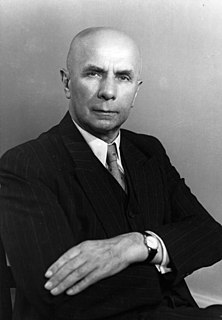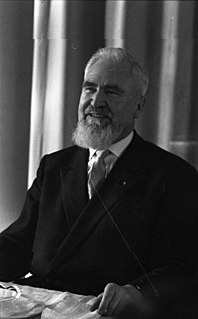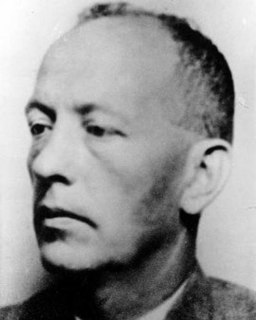
Kurt Georg Kiesinger was a German politician who served as the chancellor of West Germany from 1 December 1966 to 21 October 1969. Before he became Chancellor he served as Minister President of Baden-Württemberg from 1958 to 1966 and as President of the Federal Council from 1962 to 1963. He was Chairman of the Christian Democratic Union from 1967 to 1971.

Karl Arnold was a German politician. He was Minister President of North Rhine-Westphalia from 1947 to 1956.

Jakob Kaiser was a German politician and resistance leader during World War II.
Franz Böhm was a German politician, lawyer, and economist.
The Freiburg school is a school of economic thought founded in the 1930s at the University of Freiburg.

Andreas Hermes was a German agricultural scientist and politician. In the Weimar Republic, he was a member of several governments, serving as minister of food/nutrition and minister of finance for the Catholic Zentrum. During the rule of the Nazi Party, Hermes was part of the right-wing resistance, for which he was imprisoned and sentenced to death. After World War II, he co-founded the Christian Democratic Union.

Carl Otto Lenz is a German lawyer, member of the German Bundestag (1965–1984) for the CDU and Advocate General at the European Court of Justice (1984–1997).

Hermann Ehlers was a German politician. He was the 2nd President of the Bundestag from 19 October 1950 to 29 October 1954.
Joseph-Ernst Graf Fugger von Glött , since 1940: Fürst Fugger von Glött was a German politician and representative of the Christian Social Union of Bavaria. He was a member of the Bundestag of Germany between 1949 and 1953. From 1954 to 1962 he was a member of the Landtag of Bavaria. He is a member of the famed Fugger family, the preeminent bankers of the renaissance era.

Robert Lehr was a German politician. He served as Federal Minister of the Interior from 1950 to 1953 under chancellor Konrad Adenauer.

Friedrich Carl Nicolaus Constantin von Dietze was an agronomist, lawyer, economist, and theologian. He was a member of both the Confessing Church and the "Freiburg Circle" during the Nazi era.

Werner Johannes Hilpert was a German politician of the Centre Party and CDU, and is largely considered one of the founding fathers of the Federal Republic of Germany.

Alois Hundhammer was one of the most prominent politicians in Bavaria after World War II.

Anton Storch was a German trade unionist, politician, a member of the Christian Democratic Union (CDU) and the minister of labor from 1949 to 1957.
The Association of the German Farmers Associations (VdB) existed from 1900 to 1934 and was an amalgamation of Christian farmers’ organizations. From 1900 to 1916 it was called "Association of Christian German Farmers Associations" and from 1931 to 1934 it used the name "Association of German Christian Farmers Associations".

Margarete Gröwel was a German teacher who became a politician. Later, in 1953, she became the first woman to serve in the German consular service in Houston.
Josef Stingl was a German politician who served as the longstanding president of the Bundesanstalt für Arbeit from 1968 to 1984. By that time he had already established himself as a national politician as a member of the CDU and, after he relocated to Munich, the CSU). From 1953 to 1968, he served as a member of the Bundestag. There, he took a particular interest in pensions and labour law.

Matthias Zimmer is a German author and politician of the Christian Democratic Union (CDU) who has been serving as a member of the Bundestag from the state of Hesse from 2009, winning a constituency in Frankfurt am Main for three terms until 2021.
Tim Peters is a German political scientist, lawyer and politician of the Christian Democratic Union of Germany (CDU). A resident of Belgium, he is an official of the Secretariat of the European Parliament. As a political scientist, he is known as a student of Eckhard Jesse in the tradition of German extremism research, and has published works on the political tradition of the former Party of Democratic Socialism. He was one of the leading figures within the Junge Union during the early 2000s and is currently chairman of the Brussels branch of the CDU, the party's only branch outside Germany. He ran unsuccessfully as a CDU candidate for the Bundestag in the 2005 German federal election.

Franz Leuninger was a German trade unionist, politician and resistant against the Nazis' rise to power and regime. Working as a bricklayer after school, he became a member of the trade union for construction workers early on, serving as its regional leader in Silesia in the 1920s. He was a member of the city council of Breslau for the Zentrumspartei from 1930, and ran for the German Reichstag in 1933, as a strong opponent of the Nazi party.














